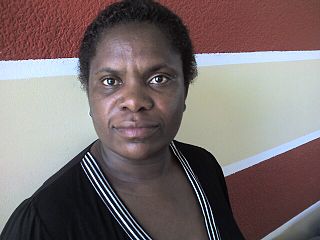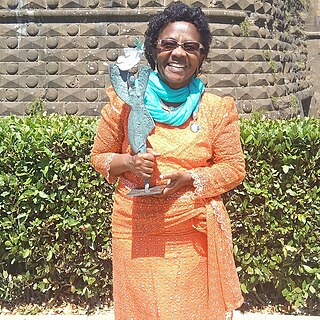Related Research Articles

Hina Jilani, is an advocate of the Supreme Court of Pakistan and a human-rights activist from Lahore in Punjab, Pakistan.

The human rights situation in Cambodia is facing growing criticisms both within the country and an increasingly alarmed international community. After a series of flagrant violation against basic human rights a feeling of incertitude regarding the direction the country is emerging, sometimes comparing the situation to a newborn Burma. In its report on Cambodia, Human Rights Watch stated that "Authorities continue to ban or disperse most public demonstrations. Politicians and journalists critical of the government face violence and intimidation and are barred from equal access to the broadcast media. In addition, the judiciary remains weak and subject to political influence. Sex trafficking in Cambodia of women and children through networks protected or backed by police or government officials is rampant. The government continues to turn a blind eye to fraudulent confiscation of farmers’ land, illegal logging, and widespread plundering of natural resources.”
Sunila Abeysekera was a Sri Lankan human rights campaigner. She worked on women's rights in Sri Lanka and in the South Asia region for decades as an activist and scholar. Quitting a career as a singer, Abeysekera briefly joined the Janatha Vimukthi Peramuna and then founded the Women and Media Collective in 1984. As head of the INFORM Human Rights Documentation Centre, she monitored human rights violations by all parties in the civil war. She received the United Nations Human Rights Award in 1999 and the Didi Nirmala Deshpande South Asian Peace and Justice Award in 2013.
Statistics on rape and other sexual assaults are commonly available in industrialized countries, and are becoming more common throughout the world. Inconsistent definitions of rape, different rates of reporting, recording, prosecution and conviction for rape create controversial statistical disparities, and lead to accusations that many rape statistics are unreliable or misleading. In some jurisdictions, male-female rape is the only form of rape counted in the statistics. Countries may not define forced sex on a spouse as "rape". Rape is a severely under-reported crime with surveys showing dark figures of up to 91.6% of rapes going unreported. Prevalence of reasons for not reporting rape differ across countries. They may include fear of retaliation, uncertainty about whether a crime was committed or if the offender intended harm, not wanting others to know about the rape, not wanting the offender to get in trouble, fear of prosecution, and doubt in local law enforcement.

Denis Mukwege is a Congolese gynecologist and Pentecostal pastor. He founded and works in Panzi Hospital in Bukavu, where he specializes in the treatment of women who have been raped by armed rebels.

Sunitha Krishnan is an Indian social activist and chief functionary and co-founder of Prajwala, a non-governmental organization that rescues, rehabilitates and reintegrates sex-trafficked victims into society.

HazviperiBetty Makoni is a Zimbabwean women's rights activist who in 1999 founded the Girl Child Network, a charity which supports Zimbabwe's young sex abuse victims. The organization has rescued more than 35,000 girls and provided mentoring to at least 60,000 girls around Zimbabwe. She earned two degrees from the University of Zimbabwe, and has been awarded numerous national and international awards. Orphaned as a child and sexually abused, Makoni is the principal subject in the documentary film, Tapestries of Hope.
The Declaration on the Elimination of Violence Against Women was adopted without vote by the United Nations General Assembly in its resolution 48/104 of 20 December 1993. Contained within it is the recognition of "the urgent need for the universal application to women of the rights and principles with regard to equality, security, liberty, integrity and dignity of all human beings". The resolution is often seen as complementary to, and a strengthening of, the work of the Convention on the Elimination of All Forms of Discrimination against Women and Vienna Declaration and Programme of Action. It recalls and embodies the same rights and principles as those enshrined in such instruments as the Universal Declaration of Human Rights and Articles 1 and 2 provide the most widely used definition of violence against women. As a consequence of the resolution, in 1999, the General Assembly, led by the representative from the Dominican Republic, designated 25 November as the International Day for the Elimination of Violence against Women.

Neelam Chaturvedi is an Indian women's human rights defender and activist.

Godeliève Mukasarasi is a Rwandan social worker, genocide survivor, and rural development activist. She created the organization Sevota to support widowed women and their children after the genocide. In 2018 she was given an International Women of Courage award for her work.

Human rights in Liberia became a focus of international attention when the country's president, Ellen Johnson Sirleaf, was named one of the three female co-winners of the 2011 Nobel Peace Prize, all of whom were cited "for their non-violent struggle for the safety of women and for women's rights to full participation in peace-building work".

Fartuun Abdisalaan Adan is a Somali social activist.

Ilwad Elman (Somali: ilwaad Elman, is a Somali-Canadian social activist. She works at the Elman Peace and Human Rights Center in Mogadishu alongside her mother Fartuun Adan, the NGO's founder. She was voted the African Young Personality of the Year during the 2016 Africa Youth Awards.
Justine Masika Bihamba is a Congolese activist. As coordinator of Synergy of Women for Victims of Sexual Violence, she works to improve the lives of rural women, defend human rights and assist victims of war, especially women survivors of acts of sexual violence. This work is focussed in the province of North Kivu, and she has also campaigned for justice more widely in the Democratic Republic of Congo (DRC). She has won considerable international recognition for her achievements. She has on several occasions been subject to threats of arrest or death.

Leyla Islam qizi Yunusova, better known as Leyla Yunus, is an Azerbaijani human rights activist who serves as the director of Institute of Peace and Democracy, a human rights organisation. She is particularly known for her work helping citizens affected by forced evictions in Baku, on whose behalf she organized several small protests. In July 2014, the Azerbaijani authorities jailed Yunus under allegations of fraud and tax evasion, which are charges widely regarded as dubious. After being sentenced to 8.5 years in jail on 13 August 2015, Leyla Yunus was released on grounds of her deteriorating health on 9 December 2015, with a court converting her sentence into a suspended one.

Nadia Murad Basee Taha is an Iraqi Yazidi human rights activist who lives in Germany. In 2014, she was kidnapped from her hometown Kocho and held by the Islamic State for three months.
Mozn Hassan is an Egyptian women's rights campaigner. The founder of Nazra for Feminist Studies, she took part in the protests of the Egyptian revolution of 2011 and worked to help those who were sexually assaulted at the time. Since then she successfully campaigned for changes to be made to the Constitution of Egypt and sexual crime laws to safeguard women. Hassan was awarded the Global Fund for Women’s inaugural Charlotte Bunch Human Rights Award in 2013. She also received the Right Livelihood Awards, known as the "alternative Nobel Peace Prize", in 2016. She is currently subject to a travel ban and asset freeze by the Egyptian government for allegedly violating foreign funding laws.

Katana Gégé Bukuru is a Congolese activist fighting for women rights. She is also the founder of the SOFAD.

Julienne Lusenge is a Congolese human rights activist recognized for advocating for survivors of wartime sexual violence. She is co-founder and President of Female Solidarity for Integrated Peace and Development (SOFEPADI) and director of the Congolese Women's Fund (FFC). She is the recipient of the 2018 Women’s International Rights Award from the Geneva Summit for Human Rights and Democracy and the 2016 Ginetta Sagan Award from Amnesty International. She received the Human Rights Award from the Embassy of France and named a Knight of the Legion of Honour by the French Government.
Witch-hunts are still occurring in Nepal in the twenty-first century, and the persecution of marginalised individuals of the community, especially women, still persists. Witchcraft is believed to be the exercise of supernatural powers by witches. Although Nepal does not have a recorded history of systematic witch-hunts, belief in the supernatural, magic, and humans capable of exploiting both to do good or harm is pervasive. In many instances, witch-hunts are simply tribal scapegoating measures carried out to serve ulterior motives, such as getting revenge or winning property disputes.
References
- 1 2 "Mahato receives 'Per Anger Award' for defending rights of VAW victims". Kathmandu Post. 18 November 2014. Archived from the original on 8 September 2020. Retrieved 8 September 2020.
- ↑ United Nations High Commissioner for Refugees. "Nepal's government fails to protect women human rights activists". Refworld. Archived from the original on 8 September 2020. Retrieved 8 September 2020.
- 1 2 "Nepal: Threats and acts of harassment against WOREC members / June 11, 2007 / Urgent Interventions / Human rights defenders / OMCT". www.omct.org. Archived from the original on 8 July 2016. Retrieved 9 September 2020.
- 1 2 "Nepal: Act now for Rita Mahato". www.amnesty.org. Archived from the original on 29 April 2020. Retrieved 8 September 2020.
- ↑ "2014: Rita Mahato". Forum för levande historia. Archived from the original on 3 September 2017. Retrieved 8 September 2020.